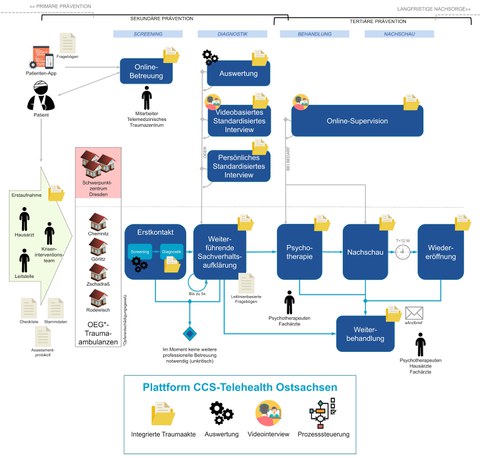Projekt "Telemedizinisches Netzwerk Psychotraumatologie Sachsen (Tele-NePS)"
Belastende Ereignisse, wie schwerwiegende Unfälle, (häusliche) Gewalt oder Kriege, sind häufige Ursachen für traumatische Folgestörungen. Aufgrund ihrer Vielschichtigkeit und der hohen Rate an Chronifizierungen verursachen sie eine hohen Versorgungs- und Betreungsaufwand. Eine frühzeitige und passgenaue Intervention kann dem effektiv entgegenwirken. Dem gegenüber stehen jedoch eine hohe Diagnoseunsicherheit bei Hausärzten und nicht psychotherapeutischen Fachärzten sowie vorhandene Versorgungslücken. Das „Telemedizinische Netzwerk Psychotraumatologie Sachsen“ (Tele-NePS) soll zukünftig die integrierte Behandlungskette von Traumafolgestörungen etablieren und nachhaltig verbessern. Im Rahmen dieses Projektes werde moderne IuK-Technologien genutzt, um Kommunikation und Kooperation in der krankheitsspezifischen Versorgung zu verbessern. Im Ergebnis soll eine institutionsübergreifende verfügbare Dokumentation gewährleisten, Fachwissen flächendeckend verfügbar zu machen und standardisierte Screening- und Diagnoseverfahren umzusetzen. Die resultierenden Vorteile aufseiten der Leistungserbringer münden in eine Verbesserung der Behandlungsqualität für den Patienten.
In Zusammenarbeit mit unseren Partnern, die Klinik und Poliklinik für Psychotherapie und Psychosomatik des Universitätsklinikums Dresden sowie die Carus Consilium Sachsen GmbH, wird eine IT-Lösung erarbeitet, welche in die entwickelte Telehealth Plattform Ostsachsen (THOS) integriert werden soll. Neben der Vernetzung der professionellen Teilhaber ist ebenfalls eine intensivierte Einbindung des Patienten in die eigenen Versorgungsprozesse Bestandteil des Projektes. Somit erweitert das Projekt Tele-NePS Resultate vorangegangener Forschung und verfolgt fortwährend die Ziele einer verbesserten Versorgungsqualität bei effizienterer Ressourcennutzung des Gesundheitswesens.
Hintergrund
Traumafolgestörungen haben zahlreiche Gesichter. Das Spektrum umfasst direkte Reaktionen im Anschluss an das extreme Erlebnis (ABR) sowie die oft verzögert auftretende Posttraumatische Belastungsstörung (PTBS) und weitere traumaassoziierte Symptomatik, wie Angst, Depression und Suchterkrankungen. Präventive Maßnahmen sind gleichermaßen gefordert wie spezifische Behandlungsangebote, um auf die individuellen Krankheitsumstände adäquat reagieren zu können. Die Psychotraumatologie ist somit einem komplexen und höchst individuellen Versorgungsbedarf konfrontiert.
Unsicherheiten in der Diagnosestellung und in speziellen Behandlungsanforderungen sind nicht nur durch mangelnde Sensibilisierung sowie Unkenntnis über posttraumatische Störungsbilder begründet. Eine weitere Ursache ist, dass im Erstkontakt das traumatische Erlebnis selbst nicht angesprochen wird. Dies kann mit verbundenen Schamgefühlen zusammenhängen, aber auch damit, dass die Betroffenen ihre Symptome selbst nicht mit dem Erlebten in Verbindung bringen. So erschließt sich einem Therapiebedürftigen und eventuell auch den Erstkontaktstellen nicht sofort das mögliche Vorliegen einer Traumafolgestörung. Verbesserungspotentiale der Versorgung schließen sich den Problemen des Erkennens einer traumaassoziierten Erkrankung an. Stark fragmentierte, oft inhaltlich nicht abgestimmte Hilfeleistungen und fehlendes Wissen um leitliniengerechte Behandlung verursachen Versorgungslücken sowohl in der Diagnose als auch in der Betreuung. In logischer Konsequenz belasten die aufgezeigten Probleme das Gesundheitswesen auch finanziell immens. Es lassen sich daher folgende grundlegende Probleme zusammenfassen:
- Diagnoseunsicherheit bei Hausärzten und nicht psychotherapeutischen Fachärzten
- Versorgungslücken
- Hohe Kosten durch Traumafolgestörungen im Gesundheitswesen
Ziele
Ziel des Projektvorhabens ist es, telemedizinische Errungenschaften zu nutzen, um Kommunikation und Interoperabilität in der Behandlungskette zu verbessern. So ist es möglich, leitliniengerechte Beratung und Therapie effizienter einzusetzen. Zudem können sie als Grundlage von Vernetzungsvorhaben und Kooperationen dienen, z.B. um Betroffenen den niedrigschwelligen Zugang zu Angeboten zu erleichtern und Netzwerkpartnern eine Plattform für Austausch und Information zu bieten.
Zusammen mit unseren Partnern, die Klinik und Poliklinik für Psychotherapie und Psychosomatik des Universitätsklinikums Dresden sowie die Carus Consilium Sachsen GmbH, wird eine integriertes Traumaportal entwickelt, welches die verschiedenen Akteure und Zielgruppen vernetzt. Unterschiedliche Anwendungen für professionelle Leistungserbringer und Patienten bieten den Beteiligten Mehrwerte in vielen Bereichen der Versorgung. Dabei steht die bedarfsgerechte Steuerung und Bereitstellung von Informationen über in die Telehealth Plattform Ostsachsen integrierten Dienste im Fokus. Die inhaltliche Gestaltung wir in enger Zusammenarbeit mit dem TeleMedizinischem TraumaZentrum Seelische Gesundheit TMTZSG realisiert.
Die professionellen Versorgungserbringer erhalten einen Zugang zu den jeweils relevanten Informationen und Diensten. Auch der Patient wird in den informatorischen Prozess einbezogen. Tele-NePS kann an nahezu jeder Stelle des Beratungs- und Behandlungssystems dieser Störungsbilder massive Verbesserungen bewirken und damit nicht nur zu einer erheblichen Aufwandsreduktion beitragen, sondern auch das individuelle Leid der Betroffenen und die Belastung der handelnden Partner im Gesundheitswesen wesentlich verringern. Das Projekt baut vorangegangene Forschungserfolge aus und leistet einen weiteren Beitrag zur digitalen Unterstützung angepasster Versorgungskonzepte in der Region.
Unser Projektauftrag
Für die Erreichung des beschriebenen Forschungs- und Enticklungsvorhabens können wir vielfach unsere fachlichen Erfahrungen und Kompetenzen in der Gestaltung von IT-Systemen insbesondere im medizinischen Umfeld einbringen. Im Konkreten befasst sich das HeLiCT-Team im Rahmen dieses Projektes mit folgenden Schwerpunkten:
- Modellierung der begleitenden Versorgungsprozesse und Patientenpfade
- Konzeption und Entwicklung der IT-Unterstützung des Versorgungsprozesses sowie der Patienteneinbindung
- Sicherstellung der Integration in die bestehende THOS-Plattform
- Ableitung wiederverwendbarer Modelle und Anwendungen
Neben der avisierten Lösung zur Verbesserung der Versorgung von Traumafolgestörungen werden somit auch die Weiterentwicklung bestehender Forschungsergebnisse sowie die Generierung wiederverwendbaren Wissens adressiert.





